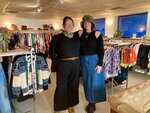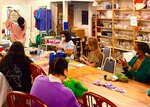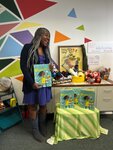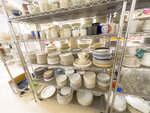



Most of us know the dopamine rush that comes with hitting “order” online, and the fleeting thrill of the unboxing that follows, but in a state that harkens to the ocean in its nickname, a shift toward more sustainable consumerism can be even more appealing than the lure of two-day delivery. With this sentiment in mind, Charlotte von Meister and Danielle Sturm founded Rhode Island’s first slow fashion collective, and late last year, The Nest grew into a bigger space on Carpenter Street in Providence, where racks of secondhand styles are complemented by a second floor dedicated to community outreach.
“We’re an educational space first, where people can learn and meet other people,” says Sturm. Through monthly clothing swaps, knitting and sewing clubs, tailoring and mending appointments, and more, events get clients thinking about The Nest’s mission of “combatting overconsumption and waste in the textile and fashion industry.”
Hailing from the midwest where she grew up thrifting, Sturm sought refuge in scouring for cool, unique plus-size clothing she couldn’t find in traditional stores. As her collection grew, she realized, “If I’m having this problem finding plus-size clothing, other people must be too, so I started reselling on Instagram.” For von Meister, shopping at Closet Revival in Newport was her first foray into consignment, before working at fashion startups in New York City. “The longer I worked within the fashion industry,” she relays, “I really started to see how toxic it was, from production to end of life of the product, and especially the pushy consumerism.”
The pair’s journeys converged over a dinner to discuss splitting a booth at the Providence Flea in 2021 and snowballed into finding their first space on Craigslist, where they let their business model grow organically, guided by what their clientele were seeking: a thoughtful alternative to fast fashion.
Rather than pushing sales, von Meister explains, “With all the different offerings we have at The Nest, we’re really trying to meet people where they are on their conscious consumerism journey. Not everyone shops second-hand, but if you’re still buying new, come to our tailoring service or come to a sewing class and learn how to make it yourself.”
Although recycling can sometimes be a viable option, Sturm emphasizes that sustainability starts with purchasing. “The fashion industry hides behind the oil industry because the majority of clothes and fast fashion are made of plastic, which is derived from oil,” she explains, pointing to polyester, which melts down and releases chemicals.
Sheri Griffin, the operations director of the Creative Reuse Center of RI echoes this sentiment. “Reduce, reuse, and repair are so much better than recycle,” says Griffin. “Keeping items from the landfill not only saves space, it saves energy and greenhouse emissions.” By taking donations of excess materials and making them available at very low prices for educators and makers, the East Providence center inspires creativity when it comes to turning trash into treasure.
“We keep the price of experimentation low, so that the environmental and social benefit is high,” says Griffin, explaining that their mission is to forge a deliberately anti-racist, safe, accessible space, dismantling barriers to “liberate creative practice.” The Creative Reuse Center opened in October of 2022, following the closure of South Providence’s Resources For Rhode Island Education, which had been an outlet for recycling and reuse for 30 years. “We were able to take on their leftover inventory, and we are seeking to restart their relationships with contributors and customers,” Griffin explains.
From crafting materials like fabric, beads, and drawing pads to a collection of film negatives of moon photography from NASA, the Creative Reuse Center sparks creativity with its stores of goods, operating on a membership model, and asks that donors check online to see what items they’re accepting. Griffin shares that classroom supplies – paper, binders, paints, and brushes – are always in demand, along with crochet hooks and wool.
Not sure where to begin? Workshops demonstrate how to sew or crochet, make journals, and craft with unique items. “Many of our customers love to learn techniques,” says Griffin. “Some are interested in how to use unlikely items, such as cardboard tubes, tin cans, and rope in their studios or classrooms.”
Oftentimes, sustainability missions go hand in hand with human rights initiatives. Along with keeping furniture out of landfills, the South County Habitat for Humanity ReStore retail space in Charlestown fuels the nonprofit’s mission of building affordable housing. “We’re just one of the over 1,000 thrift stores located in the US and Canada that takes in gently used furniture and household goods for resale, which gives us the money to purchase land and materials to build houses,” says manager Jason Brown, sharing that they’ve built 58 houses and served 122 families.
“A huge component of our customer base are landlords and DIY-ers working on projects and remodels on a budget,” says Brown. “Donating and shopping second-hand is a great way to perpetuate more sustainable practices in our daily life.”
Being selective about the items you bring into your home begins with thoughtfully removing the things you don’t need, which is why a lynchpin of The Nest’s business model is decluttering. “We call it closet therapy because we’re so sentimentally attached to our belongings; it’s either attachment to the past or fear of the future that people hold onto things,” says von Meister, a certified KonMari Consultant™, the method founded by author/TV personality Marie Kondo. “Clutter holds so much emotion, and when you get rid of it and handpick and curate the things you want to keep, that energy radiates to the rest of your life.”
Through partnerships with Big Brothers and Big Sisters, along with a local textile recycling facility, von Meister takes apparel out of the home to redistribute, and selected items can be consigned at The Nest, where clients can earn back a profit on items sold.
During their first few weeks open in the new location, Sturm shared that several new faces had stopped by the shop, and over the years, curious visitors have not only found their most empowered selves shopping racks at The Nest but also have become resident sewists and tailors at the collective. “Rhode Island is such a special place,” says von Meister. “Being the smallest state, there’s great pride in small businesses and shopping local, and there’s this great sensibility around environmentalism and sustainability.”
Make learning to mend your New Year’s resolution by finding a class near you. Along with beginner and (coming soon) advanced classes at The Nest, here’s a handful of sewing shops offering mending lessons:
Master The Art of Sewing, Providence
Rhode Island Weaving Center, Wakefield
Rose Thornwood Handmade, Tiverton
Sew Nice Fabrics, Portsmouth
The Sew Op, North Kingstown
Stitch Supply (formerly Knit One Quilt Too), Barrington
West Side Sewing Studio, Providence
The Creative Reuse Center of RI, East Providence | CreativeReuseCenterRI.org
The Nest, Providence | TheNestPVD.com
South County Habitat ReStore, Charlestown | SouthCountyHabitat.org/restore
Comments
No comments on this item Please log in to comment by clicking here